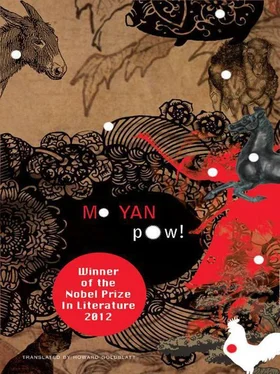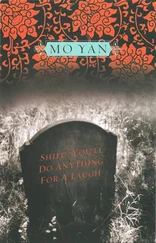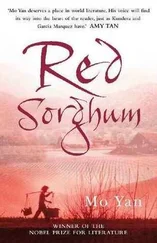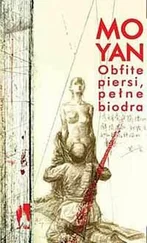Father's second departure was perhaps more important to Mother than Shen Gang's delinquent loan, because all she did was greet him with a wordless glower. A grease-covered tin on the rear rack of Shen's bicycle gave off a mouth-watering smell. I knew what it was—red steamed pig's head and cooked entrails. My mind was flooded with the captivating image of braised pig's feet and twisted lengths of braised pig's guts, and I swallowed hungrily. The momentous family occurrence of that morning had not eradicated—in fact, it had increased—my yearning for meat. The sky is high, the earth is vast, but neither is the equal of Lao Lan's mouth; Father is close, Mother is dear, but neither matches the appeal of meat! Meat, ah, meat, the loveliest thing on earth, that which makes my soul take flight. Today was supposed to be a day when I could satisfy my yearning for meat but Father's second departure shattered that fanciful dream, or at least put it off for a while. I hoped it was only a slight delay.
The pig's head hung from Mother's hand; I could eat some of it if Father came home with us. But if he remained unshakeable in his refusal to return, whether Mother, in a fit of anger, would cook it and let me at it or sell it and make me go hungry was anyone's guess. Wise Monk, I was a truly unworthy child. Only moments before I'd been in agony over my Father's second departure, but then the smell of meat drove out every other thought from my mind. I knew I'd never amount to much. If I'd been born during a time of revolution and was unfortunate enough to be an officer in the enemy camp, all the revolutionary forces would have had to do was offer me a plateful of meat and I'd have surrendered my troops unconditionally. But then, if the tables were turned, and the enemy had offered me two bowls, I'd have brought my forces back and surrendered to them. Those were the kinds of despicable thoughts that filled my head. Later on, great changes occurred in my family, and once I could satisfy my desire whenever I felt like it, I finally realized that there were many things in this world more precious than meat.
Another bicycle went past.
‘Hey, Yang Yuzhen, where are you off to? Going to sell that pig's head?’
I knew this one too. He was someone else who cooked braised pork; he too carried a tin on his bicycle and it too gave off a meaty aroma. He was Lao Lan's brother-in-law. He'd been called Su Zhou as a child; I forget his formal name. Perhaps that was because his nickname was so special—the name of that city down south. Su Zhou, Suzhou, what were his parents thinking when they gave him a name like that? He was one of the few men in our village who was not a butcher. Some people said he was a Buddhist, that he was opposed to killing, but he braised and sold the entrails of slaughtered animals. Grease on his lips and cheeks all day long, he reeked of meat from head to toe—you'd be hard pressed to consider him a Buddhist. I also knew that he added food colouring and formaldehyde to the meat, so his products were just like Shen Gang's—bright colour, strange smell. Doctored meat was supposed to be bad for your health, but I'd rather eat unhealthy meat than healthy turnips or cabbages. I still thought of him as a good man. As Lao Lan's brother-in-law, as his virtual lackey, he should have got on well with the older man. Surprisingly, he did not. Most people tried to get on the good side of our local despot but usually came away disappointed; this made Su Zhou an odd man in their eyes. Su Zhou said, ‘There are consequences to everything, good and evil.’ He said it to adults, he said it to children and when he was alone he probably said it to himself.
Su Zhou looked back as he rode past. ‘Yang Yuzhen,’ he shouted, ‘if you're selling that pig's head, you don't need to go to town. Take it over to my place and I'll give you the same price. “There are consequences to everything, good and evil.”’
Mother ignored him and ran on, dragging me behind her. Su Zhou was pedalling hard, trying to move against a headwind that had suddenly begun to blow. It bent the bare branches of the roadside poplars and set up a loud rustle, and the sky turned dark; the sun, at a height double that of the trees, trickled down thin red rays. Every once in a while we saw dried-up cow patties on the whitened, windswept road. The farming life of our village was dead and buried; the fields lay fallow and no one raised cows any longer. So those droppings had been left by the furtive cattle merchants from West County. The sight of those patties took me back to the glorious days when I'd accompanied Father as he priced cattle and reminded me of the enchanting fragrance of cooked meat. I swallowed a mouthful of saliva and looked up at Mother's face. Rivulets of sweat—possibly mixed with tears—dampened the collar of her sweater. Yang Yuzhen, I hate you and I pity you! My thoughts then turned inescapably to the pink oval face of Aunty Wild Mule. Dark eyebrows that met in the middle, above a pair of eyes with a little white showing, atop a long and lovely pointed nose that rose above a wide mouth. The look on her face always reminded me of an animal although I didn't know which one. Later, a man came to our village selling a fine breed of foxes. When I looked into their rabbit-hutch cages and saw the secretive looks on their faces, then I knew.
Every time I went with Father to Aunty Wild Mule's house, she greeted me with a smile and handed me a steaming piece of beef or pork. ‘Eat,’ she'd say, ‘eat as much as you want. There's more where that came from.’ Her smile seemed to me tinged with something slightly devious, slightly evil, as if she were trying to lure me into doing something wrong simply because it would amuse her. I liked her anyway. She never actually got me to do anything wrong. Even if she had, I'd have gone along with it. Then I saw her and Father in each other's arms— and I tell you the truth, Wise Monk —I was moved to tears by the sight. I didn't know then about what went on between men and women, and I couldn't understand why Father pressed his lips against hers, or why they made all those slurping sounds, like they were trying to suck something out of each other's mouth (and they actually did suck out something sweet and delicious). Now I know that's called smooching, or, more refined, kissing. I, of course, had no idea what it felt like but the expressions on their faces and the way they moved struck me as something quite passionate; it may have also been agonizing because I saw tears in Aunty Wild Mule's eyes.
Mother was almost worn out; by the time Su Zhou rode past, her pace had slowed considerably, as had mine. It was not because she was having second thoughts, no, not that. She still wanted to get to the train station and bring Father home. Take my word for it. She was my mother, and I understood her; I could tell what she was thinking just by looking at her face and listening to her breathe. The main reason she was slowing down was exhaustion. She'd risen before dawn, lit a fire, cooked breakfast, loaded the tractor; then, taking advantage of the freezing temperature, poured water on the paper to make it heavier. Then had followed the dramatic reunion with Father, and she'd run off to buy a pig's head, and, I suspect, a bath at the sulphur springs that had just opened in our village (I could smell the sulphur when I saw her at the door). Her face glowed, her spirits soared and her hair was wet, all evidence of a bath. She'd come home filled with hope and happiness only to have Father's second departure hit her like a bolt of lightning or a bucket of icy water, chilling her from head to toe. Any other woman suffering a blow like that would have gone mad or cried her eyes out; my mother stood there glass-eyed and slack-jawed, but only for a moment. She knew that falling to the ground and pretending to die was not in her best interest, nor, especially, was another round of tears. What she needed to do was get to the train station as fast as possible and, before the train left, stop that homeless man—who had somehow retained his integrity—from leaving. For a while after Father left the first time, Mother had been fond of a saying she'd picked up somewhere: ‘Moscow doesn't believe in tears!’ It became her mantra. That and Comrade Su Zhou's ‘There are consequences to everything, good and evil’ were a pair of couplets that spread through the village. Mother's fondness for this saying revealed her grasp of reality. Crying does not help in a crisis. Moscow didn't believe in tears, nor did Slaughterhouse Village. The only way to deal with a crisis was to take action.
Читать дальше












